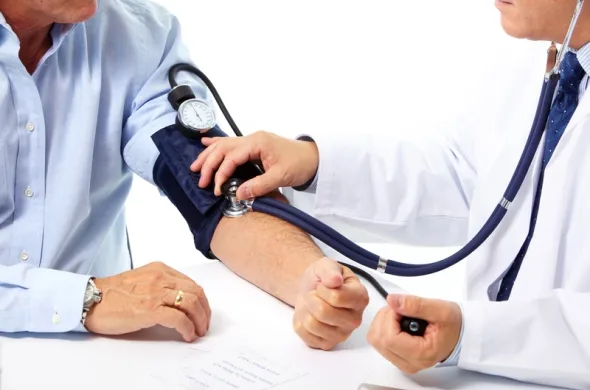When you hear the word “Hypertension,” what comes to mind? For many, it’s a single, scary number on a blood pressure cuff followed by a doctor’s advice to cut back on salt. But Hypertension isn’t a one-size-fits-all condition. Understanding the different types is the first crucial step toward managing it effectively and living a healthier life.
This isn’t just medical jargon, knowing which type you have directly influences your treatment plan and empowers you to take targeted action. Let’s break down the two main types of high blood pressure in a way that’s clear, relatable, and empowering.
First, A Quick Refresher: What is Hypertension?
Simply put, Hypertension is a condition where the force of your blood pushing against the walls of your arteries is consistently too high. Think of it like a garden hose with too much pressure; over time, that constant strain can damage the hose (your arteries) and everything it’s connected to (your heart, brain, kidneys, and more).
A normal reading is typically less than 120/80 mm Hg. Hypertension is generally diagnosed when readings are consistently 130/80 mm Hg or higher.
Now, let’s explore the two primary types.
Type 1: Primary Hypertension (Essential Hypertension)
What it is: This is the most common type of Hypertension, accounting for about 90-95% of all cases. The term “primary” or “essential” means there is no single, identifiable cause. Instead, it develops gradually over many years due to a complex mix of factors.
Think of it like this: It’s not a leak in a specific pipe you can point to; it’s the entire plumbing system gradually aging and becoming less flexible.
Key Characteristics:
- Develops gradually: It often has no noticeable symptoms for years, silently affecting your organs.
- No direct cause: It can’t be traced back to one specific medical problem.
- A combination of factors: It’s usually the result of several lifestyle and genetic factors working together.
Common Contributing Factors:
- Genetics: A family history of high blood pressure puts you at higher risk.
- Age: Arteries naturally stiffen as we get older.
- Lifestyle: This is where you have the most control. Factors include:
- A diet high in sodium (salt) and low in potassium.
- Lack of physical activity.
- Being overweight or obese.
- Excessive alcohol consumption.
- Chronic stress.
Management: The cornerstone of managing Primary Hypertension is lifelong lifestyle modification. This includes heart healthy eating (like the DASH diet), regular exercise, maintaining a healthy weight, and stress management. Medications are often also needed to help control it effectively.
Type 2: Secondary Hypertension
What it is: This type is less common but very important. Secondary Hypertension is high blood pressure that is directly caused by another underlying medical condition. It often appears suddenly and causes higher blood pressure readings than primary Hypertension.
Think of it like this: This is a specific, identifiable leak, like a faulty valve elsewhere in the plumbing system that’s causing pressure to build up everywhere.
Key Characteristics:
- Sudden onset: It can appear very quickly.
- Identifiable cause: There is an underlying medical condition to blame.
- Often more severe: It can be harder to control with standard blood pressure medications.
Common Underlying Causes:
- Kidney disease: The kidneys play a key role in regulating blood pressure. Damage or artery narrowing here is a common cause.
- Thyroid problems: Both an overactive (hyperthyroidism) and underactive (hypothyroidism) thyroid can lead to Hypertension.
- Adrenal gland disorders: Tumors or issues with these glands can cause them to overproduce hormones that raise blood pressure.
- Sleep apnea: The intermittent stopping and starting of breathing during sleep can lead to low oxygen levels that strain the cardiovascular system.
- Certain medications: Decongestants, pain relievers (like NSAIDs), birth control pills, and some prescription drugs can cause or worsen blood pressure.
- Illicit drugs: Substances like cocaine and amphetamines are major contributors.
Management: The goal here is to treat the underlying cause. For example, managing kidney disease, treating sleep apnea with a CPAP machine, or switching medications. Often, treating the root problem can significantly improve or even resolve the high blood pressure.
Other Important Classifications
Beyond the two main types, your doctor might describe your Hypertension in other ways:
- Resistant Hypertension: This is high blood pressure that remains above goal (e.g., 130/80 mm Hg) despite taking three different classes of blood pressure medications, including a diuretic. It requires careful evaluation to determine why it’s so hard to control.
- Hypertensive Crisis: This is a medical emergency. It occurs when blood pressure spikes suddenly and severely (readings higher than 180/120 mm Hg). It can cause symptoms like severe headache, chest pain, and shortness of breath and requires immediate medical attention.
Why Knowing Your Type Matters
You are the most important member of your healthcare team. Understanding whether your Hypertension is primary or secondary changes everything:
- It guides your doctor’s diagnostic tests.
- It shapes your treatment plan, is the focus on lifestyle or treating another condition?
- It empowers you to ask the right questions: “Doctor, have we ruled out secondary causes?” or “What lifestyle changes will have the biggest impact for me?”
The First Step is Always the Same
No matter what type of Hypertension you might have, the journey begins with awareness. Get your blood pressure checked regularly. If it’s high, partner with your doctor to investigate the cause. It’s not just about taking a pill; it’s about understanding your body and taking proactive steps to protect your long-term health.
Disclaimer: This article is for informational purposes only and does not constitute medical advice. Always consult with a qualified healthcare professional for diagnosis and personalized treatment plans.

What product can you recommend for detoxing. I am on medication right and I have undergone angiogram.
we have, Aloe vera tabs, moringa complex system cleaners